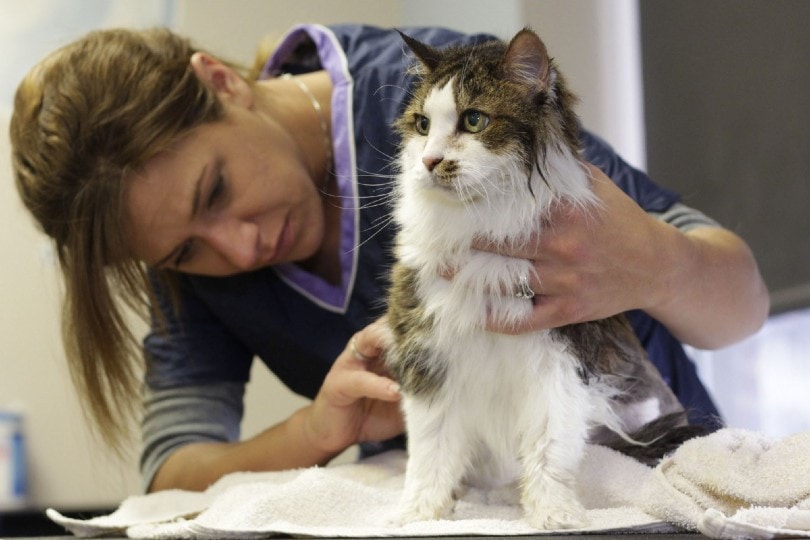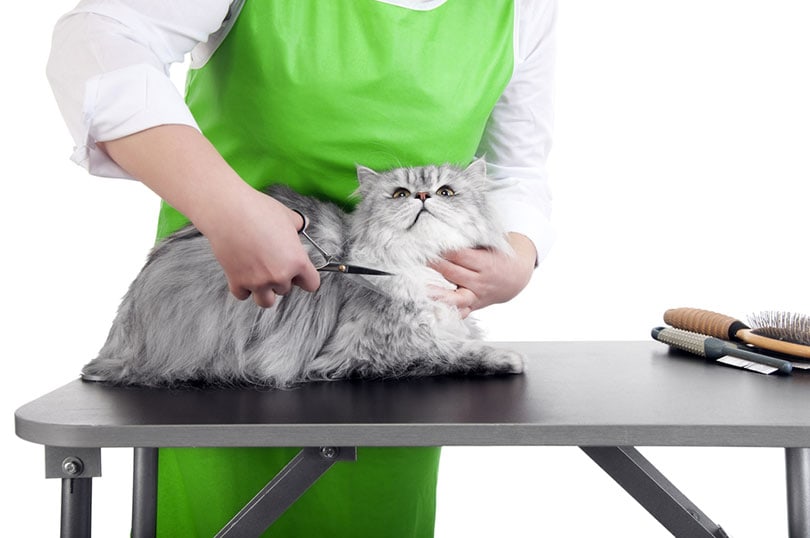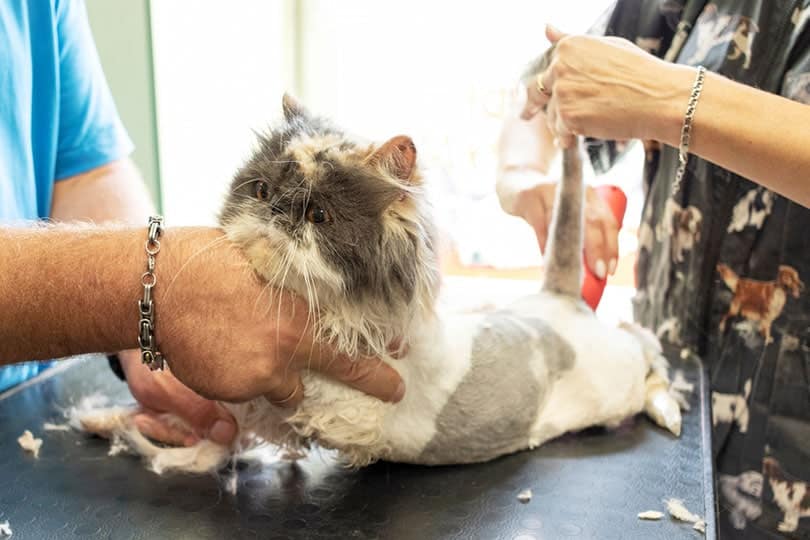PetSmart is one of, if not the largest, pet supply stores in the country, with a 29.2% market share.1 Besides selling pet food, supplies, and accessories, it offers pet grooming services, which many dog owners take advantage of. But does PetSmart groom cats?
Yes, PetSmart offers grooming services for adult cats and kittens. If you’re looking to get your feline groomed at PetSmart, you probably have many questions, like how much it will cost and what you should expect. Keep reading for the answers!
What Grooming Options Does PetSmart Offer for Cats?
The basic grooming service for cats includes nail trimming, shampooing, and teeth brushing. However, you can always opt for extra services like grooming. PetSmart’s bespoke grooming services, known as PetSmart’s Expressions, offer the following:

- Stenciling
- Nail polish and stickers
- Chalking
- Fur extensions and feathering
The basic service will suffice if you just need to get your cat spruced up. PetSmart Expressions are for cat parents who want to go one step further.
What Does PetSmart’s Cat Grooming Process Look Like?
PetSmart is meticulous with its cat grooming services, eager to give customers value for their money. Here’s a brief breakdown of its grooming process.
1. Hands-On Pet Assessment (5 to 10 Minutes)
First, a safety-certified employee of the company will carefully examine your cat’s fur and coat. They’ll check their skin, coat, nails, and teeth for any abnormalities that might be a health concern. They also do so to establish your cat’s unique grooming needs in preparation for the next step.
2. Clipping and Brushing (10 to 30 Minutes)
Next, they’ll clip tangled and matted fur on your cat’s coat and brush it to keep it smooth. They’ll also clip your cat’s nails and rid their ears of any ear wax.

3. Bath Time (10 to 30 Minutes)
The third step involves giving your cat a warm, relaxing bath. Some cats hate water, but don’t worry; the groomers at PetSmart know how to calm them down before they take the plunge. Once inside the bathtub, your cat will soak for a while before being washed with shampoo and conditioner.
Only pH-balanced shampoo and conditioner are used at PetSmart to keep your cat’s skin from flaring up and getting dry. Before the bath, you must first agree on the type of shampoo and conditioner you want them to use.
4. Drying (30 Minutes or More)
Once your pet is spick and span, the expert will begin the custom drying process. First, they’ll use a hand towel to dry off the excess moisture in your cat’s fur. Next, they’ll use a dryer to dry off your cat completely.
It’s worth noting that PetSmart doesn’t use heat dryers to dry cats and other pets. Instead, they use velocity dryers with adjustable speeds. The speed they choose depends on the specific cat breed.

5. Hair Cut and Touch-Ups
The final step involves trimming your cat’s fur to your desired length. They’ll also snip off tangled hair they might have missed earlier. Finally, the groomer will clip your cat’s nails and do some final touches. Your cat is now ready to go home.

How Long Does the Cat Grooming Process Take?
How long it takes to groom your cat depends on their size and the type of grooming services you request. The basic bath and brush package should take between 45 minutes to an hour. The full-service grooming package, on the other hand, takes a couple of hours and even longer if you opt for Pet Expressions services.
PetSmart allows both appointments and walk-in grooming services. Appointments are better to sidestep the long wait times common with walk-ins. Once you request an appointment, the staff will give you an estimate of how long the grooming should take. They’ll alert you to pick up your cat once the grooming is complete.

How Much Does It Cost to Groom Your Cat at PetSmart?
PetSmart offers cat grooming packages at different price points to cater to a wide range of customers. The basic package costs $40 for adult cats and kittens. Full grooming starts at $60 and goes up depending on the type of grooming service you want.
Here are some of the other services offered and their respective prices:
- Sanitary trim: $7
- Teeth brushing and breath freshener: $11
- Ear cleaning and flushing: $9
- Nail trim: $10
- Nail grind: $15
- PAWdicure: $20
- PAWdicure plus: $26
- Flea and tick services: $22
- Anal gland expression: $12
On completion, the groomer will go over the grooming process and answer any questions you might have. They’ll also advise you on how to take good care of your cat’s fur and check for signs of skin disease.
You’ll also get recommendations on the best products for your cat’s grooming and general well-being. At the end of the appointment, your cat friend will get a bag of treats, and you’ll get a detailed report card on the services rendered.

What Are the Benefits of Grooming Your Cat at PetSmart?
As mentioned earlier, PetSmart offers top-tier grooming services for all cat breeds. Here are a few benefits of grooming your cat at PetSmart.
Qualified Groomers
The groomers at PetSmart are safety-certified and renew their licenses yearly. They’ve also undergone over 800 hours of intensive training and have years of experience handling different pets. You can rest assured that your cat is in the hands of qualified professionals when you opt for PetSmart grooming services.
Affordable Saving Packages
PetSmart offers affordable grooming packages for cat owners on a tight budget. The only caveat is that most of these packages require buying a few products first. However, the overall savings mean that you get the most bang for your buck and that you can get discounted or free cat grooming. The pet store also offers special discounts for seniors and military personnel.
Plenty of Variety
The pet store offers a lot of variety in grooming services it offers. The basic package will cover grooming essentials, like bathing and brushing. This is enough to keep your cat clean, but you can always opt for more. If you’re looking to up the ante, you can go for Pet Expressions and get nail polish and fur extensions for your cat.

Are There Any Downsides to Grooming Your Cat at PetSmart?
While the grooming at PetSmart is top-tier, it’s not without its drawbacks. Here are a few cons of grooming your cat at PetSmart.
Expensive
Grooming your cat at PetSmart costs more than doing it yourself at home. If you’re strapped for cash, you’re better off buying shampoo and bathing and brushing your cat at home.
Limited Dental Cleaning
PetSmart doesn’t offer the full range of dental cleaning services professional dentists offer. But their standard option is enough for most cat owners.
Conclusion
Grooming keeps your cat clean and strengthens your bond with it. PetSmart has decent grooming services to keep your precious fuzz ball spick and span. For $40, you can get basic grooming services, but you can always pay more for extra services.
It’s worth noting that you don’t have to groom your cat professionally. You could still do it at home, provided that you have the right tools for the job. Plus, you probably know your furry friend better than random groomers. Choose whatever works for you and your cat, and remember that regularly grooming your cat is a must!
Featured Image: PetSmart (Image Credit: Anthony92931, Wikimedia Commons CC BY-SA 3.0)
Contents
- What Grooming Options Does PetSmart Offer for Cats?
- What Does PetSmart’s Cat Grooming Process Look Like?
- 1. Hands-On Pet Assessment (5 to 10 Minutes)
- 2. Clipping and Brushing (10 to 30 Minutes)
- 3. Bath Time (10 to 30 Minutes)
- 4. Drying (30 Minutes or More)
- 5. Hair Cut and Touch-Ups
- How Long Does the Cat Grooming Process Take?
- How Much Does It Cost to Groom Your Cat at PetSmart?
- What Are the Benefits of Grooming Your Cat at PetSmart?
- Are There Any Downsides to Grooming Your Cat at PetSmart?
- Conclusion











